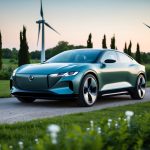Environmental Impact
Hybrid and electric vehicles offer distinct environmental benefits, particularly concerning emissions and overall lifecycle. Each has its strengths in reducing the carbon footprint but also presents unique challenges.
Emissions Comparison
Electric vehicles (EVs) produce no tailpipe emissions, making them a cleaner option in terms of local air quality. They rely entirely on electricity, which can be sourced from renewable energy, further reducing their environmental impact. Power plants generating electricity, especially those reliant on fossil fuels, can affect this advantage.
In contrast, hybrid vehicles, which use a combination of gasoline and electric power, produce emissions, albeit significantly lower than traditional combustion engines. They capture energy through regenerative braking, which improves fuel efficiency and reduces emissions. Hybrid vehicles still depend partially on gasoline, which results in some carbon footprint.
Lifecycle Analysis
The lifecycle analysis of both vehicle types includes production, use, and disposal stages. EVs have higher emissions during production due to the energy-intensive battery manufacturing process. Advances in battery technology and recycling can mitigate these impacts over time. Once on the road, EVs reduce emissions significantly compared to hybrids and conventional vehicles.
Hybrids have lower production emissions due to smaller batteries. Over their lifespan, they offer improved fuel efficiency and reduced emissions relative to conventional cars. The dual powertrain complexity can result in higher maintenance needs. Both types reduce greenhouse gas emissions over traditional vehicles, but their lifecycle impacts must be carefully considered.
Cost Analysis

When comparing hybrid and electric vehicles in 2024, two critical financial aspects come to mind: the initial purchase price and long-term ownership costs.
Initial Purchase Price
Hybrid vehicles tend to be less expensive upfront compared to electric vehicles. The advanced battery technology in electric vehicles can significantly drive up their cost. For instance, the average price of a hybrid might fall between $25,000 and $35,000. In contrast, fully electric models hover around $35,000 to $45,000 or more, depending on brand and features.
Many regions offer tax incentives or rebates for purchasing electric cars, which can partly offset the higher initial cost. These incentives vary widely by location and can sometimes apply to hybrids as well.
Long-Term Ownership Costs
Electric vehicles generally have lower maintenance costs due to fewer moving parts. They don’t require oil changes, and wear on brakes is less due to regenerative braking. On the charging front, costs depend on local electricity rates but usually remain lower than gasoline expenses.
Hybrid vehicles, while also more cost-effective than conventional cars, still rely on gasoline. This translates into ongoing fuel costs. Battery replacements for both types can be pricey, but the duration before needing a replacement can span several years.
It’s essential to consider insurance rates which might be higher for newer technology due to repair costs. In most cases, federal and state incentives for electric vehicles continue to contribute to long-term savings.
Performance and Usability
Hybrids and electric vehicles offer distinct benefits and challenges in terms of driving range and infrastructure. Here is a comparison to help you understand which might be the better choice for 2024.
Driving Range
Driving range is a critical consideration for many buyers. Hybrids often excel in this area due to combining an internal combustion engine with an electric motor, reaching ranges of 500-600 miles on a full tank and charge. In contrast, most electric vehicles (EVs) typically offer ranges between 200-350 miles per charge.
Electric vehicle manufacturers continually improve battery technology, pushing some models beyond 400 miles per charge. However, consistently achieving such range often depends on driving conditions, speed, and use of auxiliary systems like air conditioning or heating.



